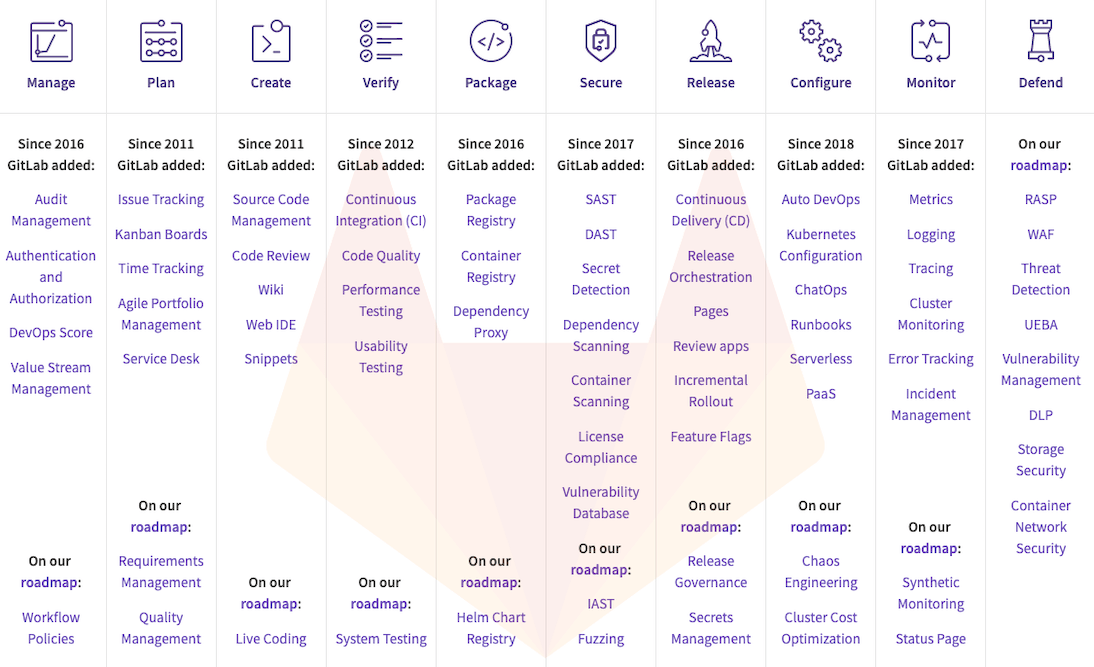Published on: November 20, 2019
3 min read
How to overcome toolchain security challenges with GitLab
Use GitLab to control your toolchain sprawl, improve team communication and productivity, and secure your DevOps lifecycle.

Integrated toolchains are on the rise, according to Forrester analyst Christopher Condo. Integrated toolchains actually faded out for a while because developers wanted to avoid vendor lock in - and because sometimes solutions didn’t play well with others. But today, the growing popularity of CI/CD and open source means more free tools in the software delivery market and dev teams are happily adding them to their arsenal.
Unfortunately, too much of a good thing can be a bad thing. Integrating, managing, and protecting the DevOps lifecycle has become a burden on many teams. In a recent Forrester report, over three quarters of survey respondents said their teams use more than two toolchains to support software delivery, and a majority reported that each toolchain is made up of six or more tools.
DevOps fosters innovation but an overly complex toolchain stifles it. Toolchain maintenance and management shouldn’t consume resources that could otherwise be invested in product development and innovation, but that’s the reality on the ground for too many teams.
Complex toolchains compromise security
Managing these toolchains has become a monumental task, with some businesses devoting 10% of their dev team to toolchain maintenance, according to the Forrester report. Besides inhibiting productivity, toolchain complexity also poses a risk to your security posture.
Most teams are tasked with integrating their toolchains by manual means, such as plugins and scripts or hard-coded custom integrations. Not only is this labor-intensive, it also adds the significant risk of human error. Additionally, more tools mean more authentication and security requirements to manage, less visibility into the software lifecycle, and no view into the process of maintaining the toolchain itself - all of which adds unnecessary risk for your IT and dev teams to deal with.
Meanwhile, the consequences of poor security practices are mounting. According to IBM, it takes businesses an average of 279 days to identify and contain a breach, at an average cost of $3.9 million.
DevSecOps with GitLab: your knight in shining armor
Luckily, we’re here to save the day. GitLab is a single out-of-the-box solution for your entire software delivery lifecycle - solving your authentication and requirement woes right off the bat. We’ve built a number of security and risk prevention measures into many of the DevOps lifecycle phases: code reviews, static and dynamic application security testing, dependency and container scanning, license compliance, and incident management. We also have an exciting array of new features on the horizon, which can be found in the table below.
 {: .shadow}
{: .shadow}
DevSecOps is a product of the shift-left movement, integrating security into the earliest possible phases of DevOps. Bringing security in at the beginning helps teams understand where certain testing processes and controls need to fall, and helps save time, energy, and resources as you move through the final phases of DevOps.
GitLab’s single application eases communication between teams, increases visibility, and streamlines your DevOps lifecycle as a whole. We’re here to help your teams achieve faster delivery cycles without compromising quality, and bring your security practices to the speed of the business.
Cover image by Jukan Tateisi on Unsplash
We want to hear from you
Enjoyed reading this blog post or have questions or feedback? Share your thoughts by creating a new topic in the GitLab community forum.
Share your feedback